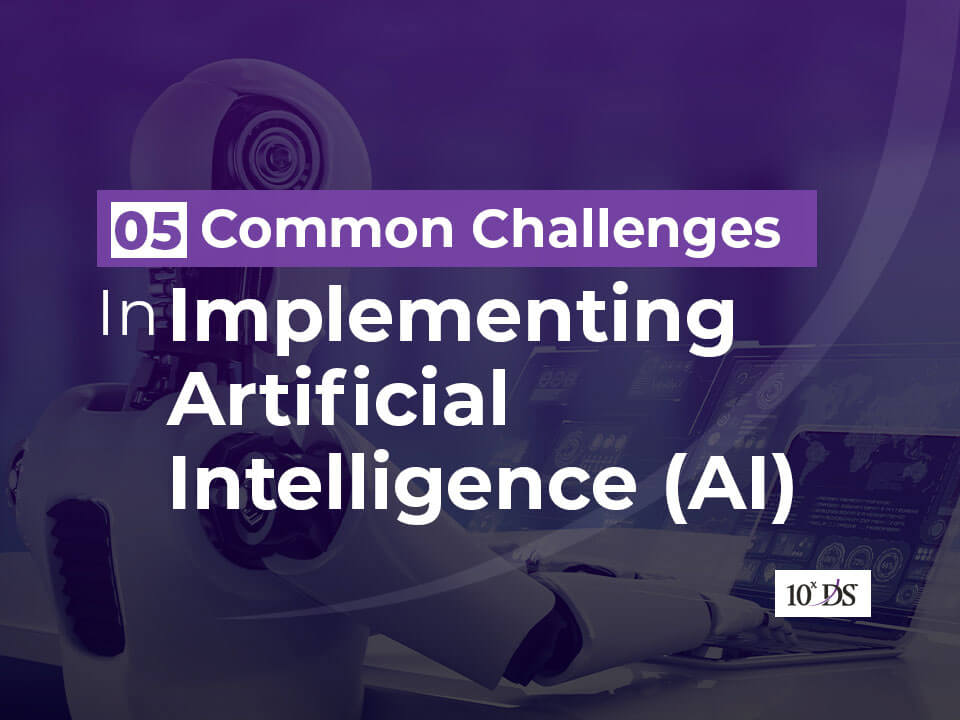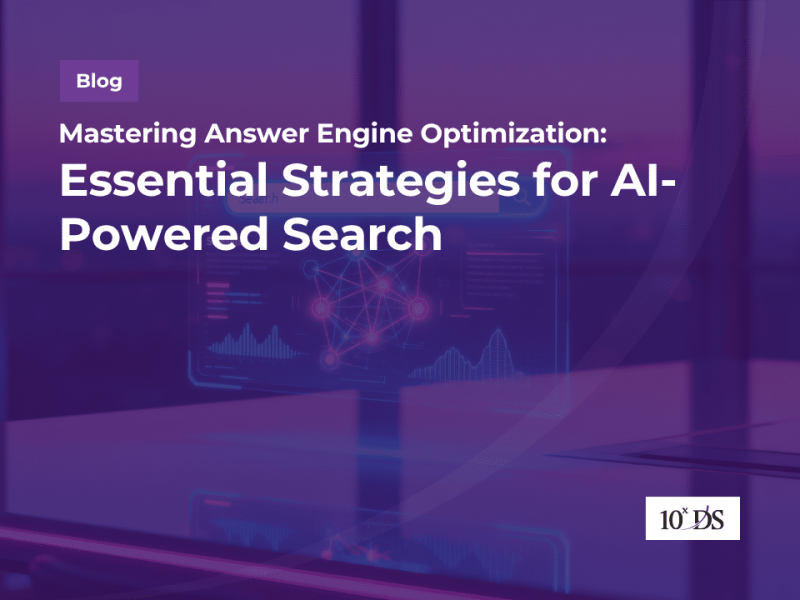
5 Common Challenges in Implementing Artificial Intelligence (AI)
Deep learning, machine learning, artificial intelligence, and other innovations in the field of technology have become the driving force for several industries. Goldman Sachs predicts the investment in Artificial Intelligence to soar up to $200 billion by the end of 2025.
AI as a technology has been hugely employed to tackle the spread of the Covid19 virus ever since last year. Several healthcare organizations have been using AI for drug discovery, diagnosing the risk of Covid19 outbreak, and service delivery. The use of advanced conversational tools and AI technology has made it possible for several businesses to work remotely along with ensuring that the demands of customers are met without any delays.
Challenges of Implementing AI
AI is a technology that has the ability to revolutionize manufacturing industries, healthcare, space exploration, and more. Artificial Intelligence is growing and gaining popularity at an excellent rate. This growing popularity of AI has urged several businesses to invest in the development and research of different AI applications like robots and automated cars.
However, it is important to note that AI is still facing a number of challenges. Here are some of the common challenges that most companies face when trying to implement Artificial Intelligence.
1. Determining the Right Data Set
As most of you are probably aware AI systems are driven and developed by leveraging quality data. This is why the process of AI implementation should start with the use of the right set of data. It can be quite hard to determine which data to use, because different types of data will be flowing across organizations.
If you want to improve the decision making and learning process of AI, it is important to identify and use the right set of data. To do this, businesses may have to get in touch with experts in the field of Artificial Intelligence, to help them guide through the correct pathway and approach to achieve the desired results and enable transformative digital experiences.
2. Data Security and Storage
Most AI applications make use of a significant amount of data for learning and making intelligent decisions. The drawback of utilizing large volumes of data is that it may create a storage issue for businesses. Moreover, data-driven automation in business operations may result in issues related to data security.
This is why it is integral for businesses to embrace the best and right data management environment if they want to implement AI. Such a data management environment will not just offer greater security to sensitive data, but it will also make it simple for businesses to access siloed data for AI and ML projects.
3. Infrastructure
Replacing outdated infrastructure with traditional legacy systems still continues to be a major challenge for most organizations. Most Artificial Intelligence based solutions have a high level of computational speed. AI-based systems will be able to achieve more speed if your business has a substantial infrastructure and high-end processors.
A recent report by McKinsey claimed that businesses that are adopting AI technology are the ones that are ready to take their business journey beyond the digital frontier. Businesses that are planning to implement AI should consider building a robust environment and flexible infrastructure fully compatible with AI-based solutions or applications.
4. AI Integration into Existing Systems
It might come as a surprise to many readers when they hear integrating AI into existing business systems is a challenge for most businesses. In fact, this is one among the most common challenges most businesses face when trying to implement AI.
Businesses looking for proper implementation of Artificial Intelligence into their existing systems will require the help of AI solution providers having extensive expertise and experience in the field of AI, from conception to deployment.
5. Complex Algorithms and Training of AI Models
The function and performance of business intelligence operations heavily rely on AI algorithms. Enterprises planning to implement AI should have a clear idea of how AI-based solutions or technologies work and will be able to transform their outcomes. Once you have implemented or created AI-based algorithms, you will realize that continuous training of ML or AI models might require considerable manpower which can become quite challenging for the enterprise. However, the benefits of implementing AI solutions in the enterprise far outweigh the challenges.
Ethical concerns of AI
It is essential to approach the development and deployment of AI with careful consideration of its potential societal impacts and to prioritize ethical principles such as fairness, transparency, accountability, and human well-being. Ethical concerns surrounding AI are multifaceted and continue to evolve as the technology advances. Some of the key ethical considerations include:
Bias and Fairness
AI systems can inherit biases present in the data they are trained on, leading to unfair or discriminatory outcomes. Addressing bias and ensuring fairness in AI algorithms is crucial to prevent reinforcing existing societal inequalities.
Privacy and Surveillance
AI systems often rely on vast amounts of personal data to function effectively. There are concerns about the potential misuse of this data for surveillance purposes or invasion of privacy, highlighting the importance of robust data protection laws and ethical data practices.
Transparency and Accountability
Many AI algorithms operate as black boxes, making it challenging to understand how they arrive at their decisions. Lack of transparency and accountability can undermine trust in AI systems, particularly in high-stakes applications such as healthcare and criminal justice.
Job Displacement and Economic Inequality
Automation enabled by AI has the potential to disrupt labor markets and lead to job displacement in certain industries. There are concerns about the socioeconomic implications of widespread job loss and the exacerbation of economic inequality.
Autonomy and Control
As AI systems become increasingly autonomous, there are ethical questions surrounding who bears responsibility for their actions and decisions. Ensuring human oversight and control over AI systems is essential to mitigate the risks of unintended consequences or harm.
Security and Malicious Use
AI technologies can be exploited for malicious purposes, such as spreading disinformation, conducting cyberattacks, or developing autonomous weapons systems. Safeguarding against the misuse of AI requires robust cybersecurity measures and international cooperation.
Ethical AI Governance
Establishing clear ethical guidelines and governance frameworks for the development, deployment, and regulation of AI is essential to address these ethical concerns and ensure that AI serves the public good while minimizing harm.
As AI technologies become increasingly integrated into our personal and professional lives, it’s essential to navigate this landscape thoughtfully and responsibly. From enhancing personal productivity to driving business innovation, the potential of AI is vast, but realizing its benefits requires a nuanced understanding of best practices at both the individual and enterprise levels. In this guide, we’ll explore key principles and strategies for harnessing the power of AI effectively and ethically, empowering individuals and organizations to thrive in the age of AI.
Best practices of using AI
Individual level
At the individual level, leveraging AI involves understanding its capabilities and limitations while adhering to ethical considerations. Individuals should educate themselves on the implications of AI in their personal lives, including privacy concerns and potential biases. It’s essential to critically evaluate AI-driven recommendations and decisions, seeking diverse perspectives and questioning assumptions. Embracing a continuous learning mindset and staying informed about advancements in AI technology can help individuals make informed choices and effectively integrate AI into their daily routines for tasks such as personal assistance, entertainment, or health monitoring.
Enterprise level
At the enterprise level, effective utilization of AI requires strategic planning, cross-functional collaboration, and a commitment to ethical AI practices. Organizations should identify high-impact use cases where AI can drive value and improve business outcomes. This involves investing in talent with expertise in AI and data science, fostering a culture of experimentation and innovation, and establishing clear governance and accountability mechanisms. Prioritizing transparency, fairness, and accountability in AI development and deployment is crucial to building trust with stakeholders and ensuring responsible AI adoption. Additionally, organizations should continuously evaluate the performance and impact of AI systems, iterating and refining their approaches based on feedback and lessons learned. By integrating AI into their operations thoughtfully and responsibly, enterprises can unlock new opportunities for growth, efficiency, and competitive advantage while mitigating risks and ethical concerns.
Conclusion
Businesses will have to familiarize themselves with AI, which will help them understand how AI works. There is no denying that implementing AI to businesses can have several challenges and you will start noticing these challenges when creating an AI strategy for your business. Adopting a step-by-step and strategic approach will simplify the process of AI implementation to a certain level.
Talk to our experts to help you with the perfect AI technology adoption to streamline your business processes, drive better value for your employees and customers, and accelerate growth.


